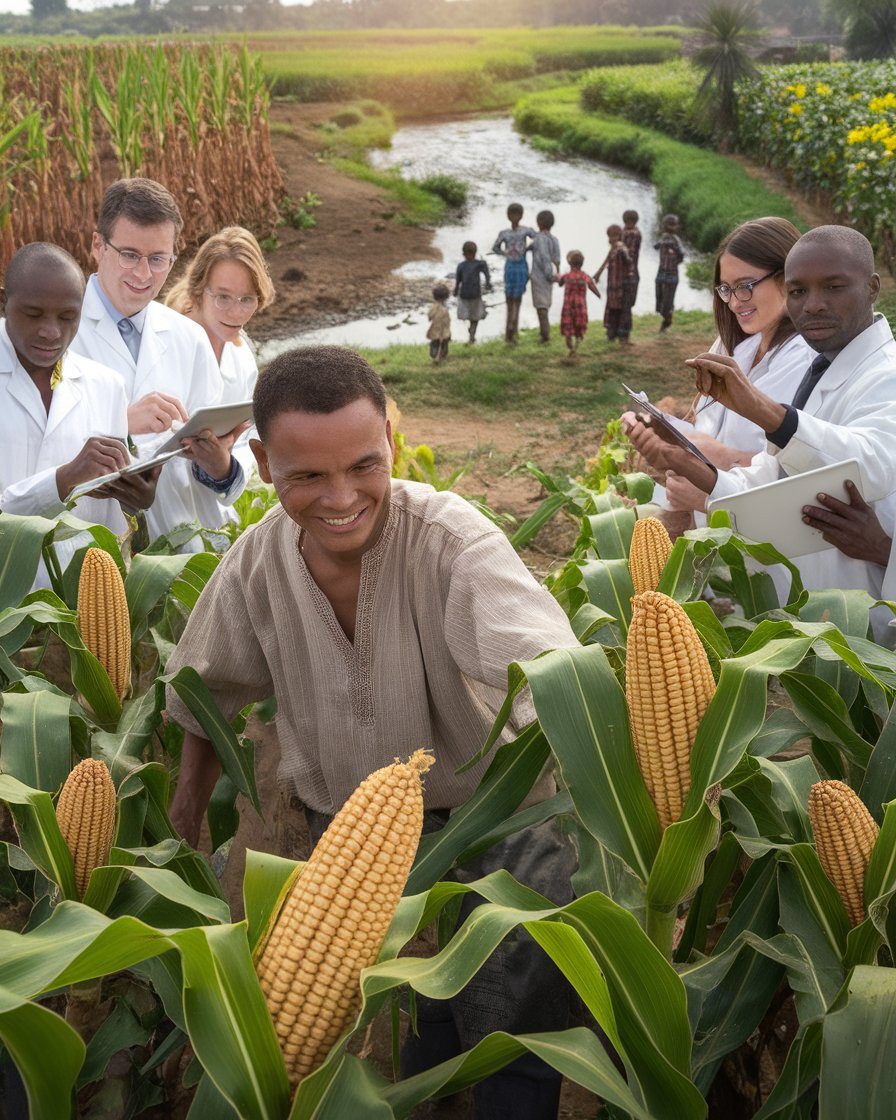Introduction
The research surrounding genetically modified organisms (GMOs) has become a central focus in modern agricultural science, with leading scientists at the forefront of this movement. Their efforts aim to enhance crop resilience, boost productivity, and address global food security concerns. Using biotechnology, these researchers are developing genetically modified crops that can withstand pests, diseases, and extreme climate conditions. This scientific progress not only benefits smallholder farmers but also contributes to global food systems, ensuring that more people have access to safe and nutritious food.
The safety and effectiveness of GMOs are continuously assessed by regulatory bodies worldwide, including the FDA and various international organizations. Their rigorous testing ensures that GMOs meet the highest safety standards before entering the market. Despite opposition from anti-GMO activists, the scientific community remains committed to transparent research, verifying the safety and benefits of GMOs for human consumption and environmental sustainability.
Key Takeaways
Leading scientists are crucial in advancing GMO research, improving crop resilience and global food security through biotechnology innovations.
Global collaboration among scientists accelerates the development of safer, more effective GMO crops by sharing knowledge on crop safety and agricultural productivity.
Innovations in GMO research, such as disease-resistant and drought-tolerant crops, help increase yields and reduce reliance on chemical pesticides.
GMO safety is continuously verified by regulatory agencies like the FDA, ensuring GMOs meet high standards for human consumption and environmental safety.
Genetically modified crops contribute to global food security by allowing farmers to grow more food in challenging environments and combat hunger.
Biotechnology addresses climate change by developing climate-resistant GM crops, ensuring sustainable food production in extreme weather conditions.
The Role of Leading Scientists in GMO Research and Crop Study
Leading scientists play a crucial role in advancing GMO research, helping to improve crop productivity and sustainability. Through comprehensive studies, these scientists investigate the potential benefits and risks associated with genetically modified organisms (GMOs). Their research is pivotal in developing new crops that can resist diseases, pests, and harsh climates. Projects often focus on increasing food production while ensuring the safety of GMO products for human consumption. As global demand for food grows, the scientific community continuously works on improving crop varieties using biotechnology, ensuring that farmers worldwide can benefit from these innovations. This ongoing research fosters collaboration between various countries, encouraging international consensus on the safe use of GM crops.
Key Contributions of Leading Scientists in GMO Research
1. Advancing Crop Resilience Through Genetic Research
Leading scientists have utilized genetic modification to develop crops that resist environmental challenges, such as droughts and pests. This advancement not only protects the food supply but also increases yield, ensuring that crops can thrive in less favorable conditions.
2. Collaboration Across Scientific Disciplines
GMO research involves the collaboration of experts from various fields such as biotechnology, environmental science, and agriculture. This interdisciplinary approach allows for more comprehensive research, improving the effectiveness of genetically modified crops and enhancing global food security.
3. Innovations in Biotechnology for Sustainable Agriculture
Cutting-edge biotechnology techniques, such as CRISPR, have revolutionized the creation of disease-resistant and climate-tolerant crops. These innovations allow for sustainable farming practices that reduce the need for chemical pesticides and help conserve natural resources.
4. Ensuring Safety and Regulation
Scientists working on GMO crops focus heavily on safety and regulatory requirements. Regulatory bodies like the FDA and WHO require extensive testing of GMO products before they can be marketed, ensuring their safety for human consumption and environmental sustainability.
5. Boosting Global Food Security
GMO research directly contributes to global food security by enhancing crop yields in regions affected by climate change and limited resources. By developing resilient crops, scientists are helping smallholder farmers produce more food, ensuring a stable food supply for growing populations.
Collaboration Between Global Scientists in GMO Crop Research
Leading scientists across the globe collaborate on GMO research projects, combining resources and expertise to improve crop resilience. This international effort enables researchers to share findings on GMO crop safety, biotechnology advancements, and the impact of GMOs on food security. With the shared goal of enhancing agricultural productivity, these collaborations also help ensure that smallholder farmers in different regions benefit from the innovations in genetically modified crops. Such global teamwork is essential for accelerating the development of safer, more effective GMO crops.
Key Innovations Driven by GMO Research in Agriculture
Innovations in agriculture, such as disease-resistant seeds and drought-tolerant crops, are often the result of cutting-edge GMO research. These breakthroughs have revolutionized how crops are grown, increasing yields and reducing the need for chemical pesticides. Scientists use advanced biotechnology techniques, including CRISPR, to engineer crops that can thrive under challenging environmental conditions. These innovations provide farmers with more sustainable options and help ensure a stable food supply as climate patterns shift worldwide.
Understanding the Safety of GMOs in Agricultural Science
The safety of GMOs is one of the most researched topics in modern agricultural science. Scientific consensus shows that GMOs are safe for human consumption and the environment when properly regulated. Agencies like the FDA and international organizations regularly evaluate GMO products to ensure they meet safety standards. The research focuses on the potential risks and benefits, including how GMOs affect biodiversity, human health, and agricultural practices. Leading projects, such as those funded by biotechnology companies, continuously verify the safety of genetically modified crops. This ensures that consumers can trust GM food and products, reducing opposition from anti-GMO activists and promoting acceptance across different regions.
Case Study: EFSA’s Evaluation of Genetically Modified Maize
The European Food Safety Authority (EFSA) conducted a multi-year evaluation of genetically modified maize to assess its safety. The study focused on potential allergens, toxins, and environmental impacts. Over several testing phases, EFSA concluded that GM maize posed no additional risks compared to conventional crops. Their findings, based on rigorous scientific assessments, reinforced the consensus that GMOs are safe for human consumption and the environment. This case study played a key role in building public trust in GMOs across Europe and led to the commercialization of GM maize, helping to meet food production demands.
Regulatory Bodies Ensuring the Safety of GMOs
Governments and international organizations play a vital role in regulating GMO products to ensure their safety. Agencies like the FDA, EFSA, and WHO assess the risks and benefits associated with GM crops before they are approved for commercialization. Their evaluations include testing for potential allergens, environmental impact, and long-term effects on human health. These regulatory bodies help maintain consumer confidence by ensuring that all GMO products meet the highest safety standards.
Addressing Public Concerns About GMO Safety
Despite scientific consensus on the safety of GMOs, public concern remains a significant barrier to their widespread acceptance. Misinformation and skepticism fuel opposition from anti-GMO activists. However, ongoing communication efforts by scientists and agricultural experts aim to educate the public on the rigorous safety evaluations GM crops undergo. Addressing these concerns involves increasing transparency, sharing research results, and fostering an open dialogue about the benefits and risks of GMOs in our food supply.
The Impact of Genetically Modified Crops on Global Food Security
Genetically modified crops play an essential role in enhancing global food security by addressing key agricultural challenges. Scientists use genetic engineering techniques to develop crops that can withstand extreme conditions like droughts, floods, and pests. These improvements help increase food production in regions heavily affected by climate change. GM crops are also designed to provide higher yields, ensuring that smallholder farmers can produce more food with fewer resources. As global populations grow, the need for sustainable agricultural practices becomes even more critical. GMO research projects are thus vital in ensuring that enough food is available to meet the demands of millions of people, especially in developing countries.
The Role of GM Crops in Combating Hunger
Genetically modified crops contribute significantly to combating global hunger by enabling higher food production in areas with limited resources. These crops are engineered to withstand extreme weather, pests, and diseases, allowing farmers in developing countries to produce more food under challenging conditions. As the global population continues to rise, the role of GM crops in improving food security becomes even more critical in ensuring that millions of people have access to affordable and nutritious food.
Increasing Crop Yields Through Biotechnology
Biotechnology has enabled the development of high-yield GMO crops, which help farmers produce more food on the same amount of land. This increase in crop productivity not only addresses food shortages but also reduces the environmental footprint of farming by minimizing the need for additional land and resources. GM crops, such as maize and soy, have already demonstrated their potential in boosting food supplies, making biotechnology an essential tool for future agricultural growth.
“Genetically modified crops hold great potential to improve food security, especially in regions where agriculture faces the greatest challenges due to climate, pests, and disease.” — Norman Borlaug
Source: Nobelprize.org
Biotechnology’s Role in Addressing Climate Challenges Through GMO Research
Biotechnology has emerged as a powerful tool in combating the adverse effects of climate change on agriculture. Through the research and development of GMOs, scientists are helping farmers adapt to changing environmental conditions. For instance, genetically modified plants can be engineered to survive in drier climates, reducing the strain on water resources. Projects involving climate-resistant crops have shown significant potential in regions where traditional farming methods struggle. This innovative approach not only improves crop resilience but also contributes to sustainable farming practices. By adopting biotechnology in agriculture, farmers worldwide can mitigate the impact of climate-related challenges and ensure stable food production for future generations.
Developing Climate-Resistant GM Crops
With the increasing threat of climate change, the development of climate-resistant GM crops has become a priority in agricultural research. Scientists are using genetic modification to create crops that can thrive in extreme weather conditions, such as droughts, heatwaves, and floods. These crops help farmers adapt to the changing climate and ensure continuous food production even in the face of environmental challenges.
The Future of Sustainable Agriculture with GMOs
Sustainability is at the core of modern agricultural practices, and GMOs play a crucial role in achieving this goal. By reducing the need for chemical inputs and improving water efficiency, GM crops contribute to more environmentally friendly farming methods. As the demand for sustainable food production grows, biotechnology will continue to provide innovative solutions that balance the need for increased crop yields with the protection of natural resources.
Conclusion
The advancements in GMO science have proven essential in addressing global food security and climate challenges. Through biotechnology, genetically modified crops are designed to withstand extreme weather conditions and pests, offering smallholder farmers the tools they need to boost productivity. These innovations not only help combat hunger but also promote sustainable agricultural practices across different regions. Regulatory bodies ensure the safety of GMOs by conducting rigorous testing, making sure they meet high standards before reaching consumers.
Despite skepticism and opposition, scientific consensus supports the safety and effectiveness of GMOs in enhancing crop resilience and reducing the environmental footprint of farming. Collaboration between global scientists, supported by organizations like the Alliance for Science, continues to push GMO research forward, ensuring that innovations benefit both food security and the environment. As climate change continues to impact agriculture, biotechnology remains a key solution for maintaining sustainable food production.













